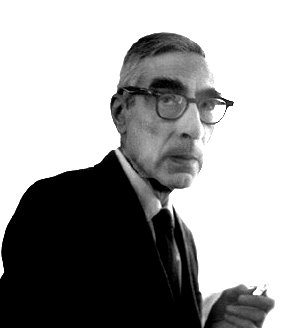Louis Zukofsky, 'Anew' 12
LISTEN TO THE SHOW
 One of the signal steps forward in the PennSound project — the gathering of recordings of modern and contemporary poets reading their own poems — was the release of the recordings of Louis Zukofsky, thanks to the generosity and cooperation of Paul Zukofsky. The recordings on PennSound’s Zukofsky author page are being made available for non-commerical and educational use only (in line with PennSound’s mission), and any other use can only be done by permission of Paul. (If you need to contact him, just write us and we’ll put you in touch: poemtalk [AT] writing [DOT] upenn [DOT] edu.)
One of the signal steps forward in the PennSound project — the gathering of recordings of modern and contemporary poets reading their own poems — was the release of the recordings of Louis Zukofsky, thanks to the generosity and cooperation of Paul Zukofsky. The recordings on PennSound’s Zukofsky author page are being made available for non-commerical and educational use only (in line with PennSound’s mission), and any other use can only be done by permission of Paul. (If you need to contact him, just write us and we’ll put you in touch: poemtalk [AT] writing [DOT] upenn [DOT] edu.)
The Zukofsky recordings are remarkable! One of them was made in 1960 by Zukofsky at home, on a reel-to-reel tape machine. It was meant for the Library of Congress. It includes readings of some sections of the long poem Anew. PoemTalk 22 is a discussion of the gorgeous twelfth poem in the Anew series, which is untitled and gets mentioned by its first line, “It’s hard to see but think of a sea.” One gets a sense of its worked-at density from this first-line sentence alone.
The Anew poems were written between 1935 and 1944 and published in March 1946 at James Decker’s press in the small-format “Pocket Poetry” series. Marcella Booth has dated the writing of our poem precisely: January 16-17, 1944, a week before the poet’s 40th birthday. Several critics have contended that Anew was Zukofsky’s attempt at a fresh start. William Carlos Williams, a great supporter of Z and an admirer of these poems, called the writing in this work “adult poetry.” Perhaps he meant that Zukofsky was growing up, taking on seasoned topics. Certainly, at least, the end of our poem is quite personal, words coming from the poet’s contemplation of his 40th birthday, of mortality’s challenge to and provocation of open-ness. As Bob Perelman puts it (asked to compare this poem to others), “The poem is almost conversational. ‘Gee, I’m 40. I’m thinking about my entire life.’” Much of our conversation — with PoemTalkers Perelman, Wystan Curnow (visiting us from New Zealand), and Charles Bernstein — is devoted to integrating the first part (full of the language of science) with the second (the personal retrospective).
Wystan, facing a vocabulary of science he didn’t understand, wanted to look up the term “condenser” (what, after all, is a condenser really?), but then worried about his impulse to look it up. Is that a productive way of coming to understand Zukofsky’s use in verse of electro-magnetism and wireless sound? “Condensed,” after all, is an ordinary word — and a term of modernist poetry. (Bob points out Lorine Niedecker’s contemporaneous use ofcondenser to refer to poetry itself, the act of writing in the modern way, in a famous poem that technically imagines the site of the poet-maker as a “condensery”: “no layoff / from this / condensery.”) “The poem,” Charles says in praising its use of the referential language of science, “is not incomprehensible in that it will restore you to the knowledge you already had of what the word means.”
September 14, 2009